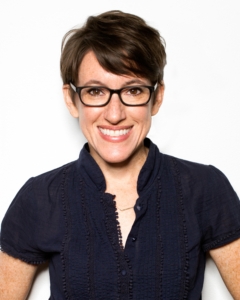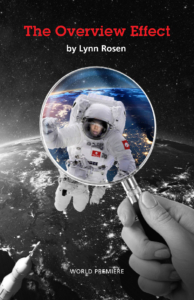INTERVIEW WITH LYNN ROSEN
Researched, interviewed, and edited by Sharon J. Anderson, CATF Honorary Board Member
CATF: When once asked, “What kind of theater excites you?” you responded, “I prefer a messy exciting play over a neat and tidy play that doesn’t have any creative lift. I learn something from every play I see.” The Overview Effect is a messy and exciting play. It is not neat and tidy. What do you want the audience to learn?
LR: I want them to feel before they learn anything, and then maybe learn something from those feelings. I want them to be moved and entertained. That’s the gateway to learning something. I never write with a goal to teach things. That’s boring theater. But if you have a good story with characters that you care about and a journey that is relatable – and maybe surprising – your feelings may unlock something in yourself. And perhaps you will learn something technical about space which is great, too.
What did you learn from writing this play?
I was commissioned to write this play about the race to space, so had to learn a whole new writing process because there was so much information that I could never fully understand. I’m kind of a planner, and with this play, I couldn’t plan a thing. When I started it, all I knew was that a race to space was the background and the rest of it was, well, “I don’t know.”
I am a resident playwright at New Dramatists, and every week I would bring in new fragments of the play for the team there to review. I knew the spine of the play was Dylan’s investigation of a potential sabotage. The fragments grew and grew to 150+ something pages to the point that I could see what I had: scenes built organically and spontaneously that were very alive. I didn’t want to feel too much about what I had produced because I can overthink things, so I just began paring it down and paring it down and paring it down. This writing process worked for me.
What is the literal and metaphorical meaning of your title, The Overview Effect?
Literally, it’s a sudden cognitive shift in awareness that astronauts get when they look back on earth and see the fragility of humanity. It’s very emotional. Metaphorically, the overview effect in this play sums up the protagonist’s trip; how far Dylan has come from being shut down inside herself since her parents’ tragedy; how through this investigation of potential sabotage during which she has to deal with people and not just machines, she gets a whole new perspective on who she is and what humanity has to offer.
How did you research this?
The two men competing with each other – Ryker and Jim – are based very loosely on Jeff Bezos and Elon Musk. This was Elon Musk, pre-fascism and pre-Twitter when I actually had a little bit of admiration for what he was doing. But I did read a lot about them and other space industrialists.
Then there was the Cassini spacecraft that orbited Saturn from 2004 to 2017, circling that planet nearly 300 times and teaching us almost everything we know about it. Before I was approached about writing this play, I was sucked into the end of the Cassini mission that I had not been following it at all. When the end of the mission popped up in my newsfeed, I started watching it and was so moved. Of course, I am sad for people who are dying all over the world – like in Ukraine – but because Cassini was a dying abstract figure, I could release more emotion. Something about anthropomorphism enables us to put more of our emotions onto a thing rather than a person.
I used to find space very scary, but writing this play made me more open to space. I now find it awesome and awe-inspiring.
Each of these characters has experienced some loss. What are you working out here in your own life?
I think I’m working out the basic questions about what other life I could have. I’m very happy with my life, but I can’t help but wonder: what if I had taken this path? I don’t want to analyze it too much because then I don’t think I would write. I do often write about women and their journeys because it is so hard for the woman to make it in any art or in any field in the world. That is definitely something I am working out through women protagonists.
What is the role of Layla? She says, “Because when we alienate our oozy sooty silty inner cosmos, we make it impossible to know ourselves, to love ourselves, or to receive love.”
She is basically the person that Dylan wants to be but could never be. She’s very attracted to her, but it’s a soul attraction. She’s the opposite of Dylan. Dylan is robots, investigation, details, facts. Layla is ooze and silk – all that stuff inside of us.
Dylan says at one point, “Sometimes we get Earth, and the Milky Way, and Saturn’s rings, roses, elephants, oceans, children who love us. And sometimes . . . it’s a disaster. And we don’t know why.”
Generally, I’m not a fan of ambiguity. I have learned as I get older to deal with things as they come. And sometimes things are just a big open question. It calms me to not know the answers to everything. We don’t know why Dylan’s parents would die the way they do while other people have amazing, beautiful lives. We don’t know when tragedy will come and when something beautiful will pop up. We just don’t know. The only answer is to embrace that there are no answers.
At the end of the play, Dylan has a choice to “stay in space untethered to life,” or to “go back home to earth with all its joys and its sorrows?” What choice would you make?
I am biased toward dealing with your feelings and emotions and being firmly on the earth as painful and as awful as it can be sometimes . . . but it can also be so wonderful.
You said, “My writing is the most potent way for me to possibly affect change. It’s ultimately the way I cope with the world.”
Sometimes I read something in the local paper that I don’t understand, usually a local story that is a microcosm of something larger. I write to literally try and understand why some people are the way they are and why they act the way they act. For instance, I wrote a play about a couple who robbed an armored car that belonged to the company they worked for. Did they work for this company forever? Why would they suddenly go from being nice people to being people who rob armored cars? And then they go on the road and become heroes.
I have another play called, Man and Beast based on an article I read about a man who kept a tiger as a pet. It’s about him and his social worker. Why would he keep a tiger as a pet? My guess was he kept the tiger as a way to empower himself in a society and a system that was built to deprive him of any power or success. In real life and in my play he is a Black man. Basically, it became a drama (with some humor) about white male fragility.
Writing is my fulfilling place, my medicine. I definitely don’t want to say that it’s my happy place because it can be frustrating to write. Doctors treat physical maladies with medicines, psychologists treat mental maladies with therapy for your brain. Artists give you medicine for the soul and it does that for me too. The act of writing is very palliative.
Arthur C. Clarke, a science fiction writer and co-writer of the screenplay 2001: A Space Odyssey said, “Two possibilities exist: either we are alone in the universe or we are not. Both are equally terrifying.”
When I read articles about how we are going to Jupiter and the research about Saturn’s moons, I think that there’s got to be some other life out there. We don’t know. It could be terrifying. Some people in this country are terrified of others simply because they are human. Is it more terrifying to think that we’re this one rock with life on it in this vast unending indefinite space? Is it impossible to think that could be true because we’re human and we live so closely with other people?
“Artists are low key astronauts. Instead of going to the moon, they sit back in their studio and make the moon” – a perspective from Michael Bassey Johnson in Song of a Nature Lover.
That is correct. The best writers are explorers. The things I like seeing the most are the things that someone is investigating that don’t supply an answer. When things aren’t all wrapped up neatly, someone is really exploring. That’s my favorite stuff. That’s my goal.
What is your greatest strength?
My humor.
What is your greatest weakness?
I have to choose? Could it be overthinking?


